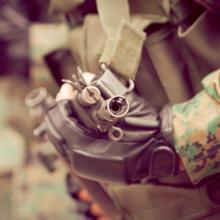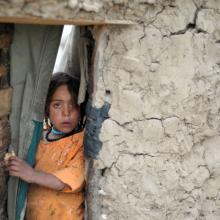War
Does violence rule our species? The barrage of international conflicts now in the headlines seems to suggest that violence may be the one language we have in common.
Though we all speak it fluently, very few of us learned it in school. We didn’t have to study its “vocabulary” and “grammar rules” – no, it was much easier than that. Humans pick violence up by immersion and so we are all native speakers. From Syria to Korea to Pakistan to Iraq to the U.S., the language of violence is so natural to us that we couldn’t recite one of its “grammar rules."
Sadly, ignorance of language rules does not diminish fluency. The odd thing is that if we stopped to learn the rules governing our fluency in violence, it would actually make us less fluent. Why? Because the rules of violence reveal an unpleasant reality: We don’t use violence; violence uses us.
Glorybound, by Jessie van Eerden. WordFarm.
A luminous debut novel that features two sisters shaped by family estrangement and holiness faith in a hard-scrabble West Virginia mining town.
Hold It 'Til It Hurts, by T. Geronimo Johnson. Coffee House Press.
This debut novel and 2013 PEN/Faulkner-award nominee follows an African-American combat vet in his search for his missing sibling, a journey tangled with the fallout of war and race.
The Mirrored World, by Debra Dean. Harper.
A reimagining of the life of an 18th century Russian saint, Xenia of St. Petersburg, set against the excesses of the royal court.
Benediction, by Kent Haruf. Knopf.
An elderly man in a small Colorado town receives a terminal diagnosis, and the intricacies of human community are revealed in the stories of the people who gather around him.
I
The crumpled woman pushes through the door
and sees your plump limp limbs
held tight in my buckled arms.
She remembers holding
such sweet eternity.
IT'S BEEN SAID that one of the most radical things Jesus did was to eat with the wrong crowd. Undoubtedly, folks on the Left were frustrated with Jesus for making friends with Roman tax collectors. And folks on the Right were surely ticked at him for hanging out with Zealots. Dinner must have been awkward with both of them at the table; after all, Zealots killed tax collectors for fun on weekends.
But Jesus was a subversive friend, a scandalous bridge-builder, a holy trespasser. Just as we are known by the company we keep, so was Christ—accused of being a "glutton and a drunkard, a friend of tax collectors and sinners" (Luke 7:34). He was put on trial for being a rabble-rouser and a traitor. He got in trouble with the religious elite for crossing the line, overstepping purity laws and cultural norms, and disrupting the status quo. His love had no bounds and his friendships defied categories. He insisted on calling his followers friends: "I no longer call you servants, because a servant does not know his master's business. Instead, I have called you friends" (John 15:15).
Jesus made friends—with folks who adored him and folks who hated him. He sat with the woman at the well, washed the feet of his disciples, wept at the death of his buddy Lazarus, and loved his mom and dad. But his love went beyond borders. He redefined family, inviting his followers to be "born again" and discover an identity that runs deeper than biology. He challenged the chosen and included the excluded—in the family of God.
I wonder who Jesus would be hanging out with if he were around today?
"Blessed are the peacemakers, for they shall be called sons [and daughters] of God.”
Matthew 5: 9 from the Beatitudes
I grew up watching casualty reports from the Vietnam War on TV. My Uncle Bill, a lieutenant colonel in the Air Force, was serving there. My family watched the news every evening to learn about the latest casualty reports. I was too young to understand the anxiety of my parents, but I felt the tension while Uncle Bill was deployed.
As an adult, it’s been a different story. I understand and experience things more fully and have an emotional connection to what I see and hear. That has been true for the last decade. Ten years ago, the Iraq War began. Ten years marked by conflict, violence, and loss. Ten years of debate about why we went to war and why we remained. Ten years dealing with death and injury – 4,488 U.S. deaths and 32,321 soldiers coming home with significant injuries. Suicide rates of soldiers are so high it is impossible to ignore – some while in Iraq and others after returning home. Traumatic brain injuries, grieving families, moral injury, and multiple limb loss are just a few of the constant reminders of the tremendous costs of war. The toll on the nation’s economy has been long lasting as well. The jobless rate among veterans is staggeringly high.
The human toll has been significant. But military personnel aren’t the only causalities of this war. Numbers vary, but statistics tell us more than 100,000 Iraqi citizens also have been killed and nearly 3 million have been displaced.
These figures cannot be ignored. And they are the results of war.
THIS JUST IN — horrific news from our friends in Kabul. Over the weekend two kids, age 7 and 8, were killed by NATO forces while herding cattle in the Uruzgan Province in Afghanistan.
The Afghan Peace Volunteers, with whom Shane visited a few weeks ago, took to the streets in nonviolent protest.
They were accompanied by a couple of cows, as a reminder of the innocence of these children who were killed alongside their livestock.
They carried signs that read: “We are those 2 children.” Here is a video they sent us:
Current events, like much about our lives, frequently leave us hopeless, fearful, and uncertain. Religious faith isn’t a matter of wishing away these experiences; it involves perceiving God in the midst of our hardships.
I still remember one Friday night when I, an overly sensitive preteen, made a conscious decision to stop watching the nightly news with the rest of my family. I found what I saw too depressing and threatening: crime after crime, yet another house fire, economic challenges, too much Cold War.
I don’t recall how old I was when I mustered the willpower to face the news again on a regular basis. But a quick scan of the latest headlines makes me wonder why I still subject myself to it: the imminent and potentially crippling sequester, American drones flying in and out of Niger, Iran’s growing nuclear capability, recurring bloodshed in Syria. Maybe I had it easier back in middle school.
 This week, in the run-up to Sunday's Academy Awards ceremony, we've been taking a look at each of the Best Picture nominees, the stories they tell, and the spiritual questions (and answers) they offer.
This week, in the run-up to Sunday's Academy Awards ceremony, we've been taking a look at each of the Best Picture nominees, the stories they tell, and the spiritual questions (and answers) they offer.
In today's final installment, we turn our attention to Lincoln, Silver Linings Playbook, and Zero Dark Thirty.
Recent news, including the Oscar nomination of The Invisible War and the looming sequester, which threatens drastic cuts in defense spending, doesn’t sound good for military recruiters. But recruiters are still active at my local high school, offering freebies and making promises. For six years I’ve been visiting the high school to encourage students to stop and think about their choices.
I’m not a biblical literalist, but I take the commandments to love your enemies, not to kill and not to overcome evil with evil seriously. I don’t make this argument at the school; it would violate their rules about religious expression, and I think it might alienate our neighbors who believe simultaneously in Jesus, the right to bear arms, and the need to fight ‘terrorists.'
I also have a concern for the truth. Many young people enlist in the armed forces without understanding what they’re getting into. My county is rural and poor; jobs are scarce. Many students who lack money or grades to make college a viable option are attracted by the promise of steady work, sign-up bonuses, travel opportunities, money for education — and sometimes, it seems, by clearly false promises.
The drone operators sit at consoles on military bases around the U.S. They track their targets and when the moment is right, they send the command to fire. And then people die.
Drones have been in the news a lot over the past month as Congress has considered the nomination of John Brennan to head the Central Intelligence Agency (CIA). Brennan has been the chief architect of the drone policies of the Obama administration.
The constitutional questions have gotten quite a public airing, but drones raise deeper moral questions about what constraints there are on weapons of war.
Yes, drones are efficient, effective, and economical. But what do they do to the soul of this nation, to the psyches of those who push the buttons from half a world away? If they are moral for the U.S. to use at will in any nation of the world, are they moral for other nations to use against us?
For those who are students of Africa, the Caprivi Strip of Northern Namibia brings memories of the awful border wars and independence struggles of the 1970s and 80s. Perhaps the lessons apply to Israel and Palestine.
Ironically, one of the last and longest, most peaceful and unpolluted rivers in the world is the Okavango. It is the border between Namibia and Angola where still today a long stretch of the north bank Angolan farmland is mine infested. Large breem and tiger fish jump, and magnificent fish eagles take flight from trees on the Namibian bank and wing to large dead trees in Angola where hippo provide background music with loud braying. The behemoths make their way back and forth and often spend the early evening hours lounging on the beach in front of the main buildings of the River Dance Lodge near Divindu on the southern shore.
This gently lapping, wide, drinkable stream — that creates in nearby Botswana the amazing Okavango Delta — is bordered by Angola, Namibia, and Botswana. The crystal clear ribbon of nearly 500 miles of uninterrupted resource runs just a few yards under my feet a quarter of a mile across from where the Angolan fields and forests were the hiding place for Jonas Savembi before he was killed in 2002. His South African- and American-supported troops were routed by Jose Eduardo Dos Santos, the socialist leader of UNITA and president since 1979. We can see homes there that have been vacant since the war because local farmers fled the fighting. Kavanaga tribal tradition requires people to not dwell in places where violent deaths have occurred. Ethnic tribal relations are still tense between the Portuguese-speaking Angolans and the English/German-speaking Namibians, even though they are from the same ethnic group. The horrific memories of vicious cross-river raids and shelling persist.
John McCain angrily insisted on “right” and “wrong” answers to his questions of Chuck Hagel yesterday. As a theologian and a religious leader, I want to say that John McCain is “wrong.”
I watched the hostile questions that Sen. McCain asked Hagel in the hearings on his nomination for Secretary of Defense. The angry attacks from McCain were about the Iraq War, for which McCain was one of America’s leading advocates. Hagel had previously called the war in Iraq the biggest American foreign policy mistake since Vietnam. Obviously furious, McCain tried to force Hagel to say the last “surge” in Iraq, which McCain had made his cause, was right after all. Despite the aggressive and disrespectful questioning from his former “friend,” Hagel wouldn’t submit to McCain’s demands and said these questions would be subject to history — and to theological morality, to which John McCain has never submitted his views. In fact, his repeated desire to invade other people’s countries is offensive moral hubris.
DURING THE BALKAN war of the early ’90s, I traveled twice to Bosnia and Croatia. I visited middle-class women whose husbands and sons had been brutally killed. I visited a refugee center filled with people who had lost everything and were at the mercy of any country that would take them in. I visited school children suffering from post-traumatic stress after seeing their parents killed by enemy shells that landed in their homes.
I walked through the rubble of Mostar, where the Friendship Bridge—a massive stone structure named in honor of the many ethnic groups that had crossed it for four centuries—had been bombed and destroyed. In city after city, I saw the destruction of architecture, art, museums—a violent erasure of the cultures that had thrived there.
It was the first time I had seen war up close, and I was shocked by what human beings do to each other.
While I traveled in the Balkans, another war was waged in Rwanda by Hutus against Tutsis—what we now refer to as the Rwandan genocide. Since 2009 I’ve traveled twice to the Democratic Republic of Congo, where the ethnic battles forged in Rwanda crossed borders and continue to this day. As usual in war, civilians pay the highest price. Subsistence farmers in small villages want only to live in peace, tend their crops, and feed their families. Instead, their crops are burned, wives and daughters are raped, and many become slave labor in Congolese mines that provide minerals for our cell phones and wealth for the violent criminals who control the mines.
We call upon the United Nations to negotiate an immediate cease-fire to the war in Afghanistan, and to start talks aimed at ending the war and beginning the long road to healing and recovery.
That’s what the Afghan youth said on Tuesday afternoon in Kabul, along with Nobel Peace Prize winner Mairead Maguire of Ireland, as they launched their “Two Million Friends for Afghanistan” campaign and presented their petition to a senior United Nations official.
For me, it was the climax of a heart-breaking, astonishing eight days in one of the poorest, most violent, most war-torn, most corrupt, and most polluted places on the planet — and because of the amazing “Afghan Peace Volunteers,” the 25 Afghan youth who live and work together in a community of peace and nonviolence — one of the most hopeful.
Most of us have read President Dwight Eisenhower’s 1961 farewell speech warning of the growing military-industrial complex in the U.S. Fifty years later, many of his fears have become realities. Aaron B. O’Connell, an assistant professor of history at the United States Naval Academy and a Marine reserve officer, points out in a New York Times column the part of Ike’s speech we don’t often remember: “Eisenhower’s least heeded warning — concerning the spiritual effects of permanent preparations for war — is more important now than ever.”
He explains:
“Uncritical support of all things martial is quickly becoming the new normal for our youth. Hardly any of my students at the Naval Academy remember a time when their nation wasn’t at war. Almost all think it ordinary to hear of drone strikes in Yemen or Taliban attacks in Afghanistan. The recent revelation of counterterrorism bases in Africa elicits no surprise in them, nor do the military ceremonies that are now regular features at sporting events. That which is left unexamined eventually becomes invisible, and as a result, few Americans today are giving sufficient consideration to the full range of violent activities the government undertakes in their names.”
Editor's Note: This is part three of a three-part series from Dr. Miroslav Volf an a voice instructing us how to involve our values into our present politcal debates. To read part one go HERE and part two HERE.. From part one:
In this year of presidential elections, I have decided to summarize key values that guide me as I decide for whom to cast my vote. ...
14. Equality of Nations
Value: No nation represents an exception to the requirements of justice that should govern relations between nations. America should exert its unique international power by doing what is just and should pursue its own interests in concert with other nations of the world.
Rationale: “In everything do to others as you would have them do to you; for this is the law and the prophets” (Matt. 7:12).
Debate: The debate should not be whether America is somehow exceptional (and therefore permitted to do what other nations are not—for instance, carrying out raids on foreign soil in search of terrorists). The debate should, rather, be about what it means for the one remaining superpower to act responsibly in the community of nations.
Question to Ask: At the international level, would the candidate renounce a double moral standard: one for the U.S. and its allies and another for the rest of the world? Even when the candidate considers an American perspective morally superior, will he seek to persuade other nations of the moral rightness of these values rather than imposing them on other nations?
The United States has surpassed all records in global arms sales — a whopping $66.3 billion in armaments sold last year.
Most of the weapons went to Persian Gulf nations, although India also bought more than $4 billion in military equipment. U.S. arms sales in 2011 were triple the previous year’s level and the highest annual total ever recorded.
The U.S. is once again the world’s number-one arms proliferator, accounting for 75 percent of global arms sales. Word of this dubious distinction comes as our leaders claim to support and have been working at the United Nations to negotiate a global Arms Trade Treaty.
The report makes a mockery of the UN negotiations and our government’s presumed commitment to control the arms trade.
HEY PRESIDENT OBAMA: The Nobel Peace Prize committee is calling. They want their medal back.
The coveted award, which many felt was premature, at best, when bestowed during the president’s first year in office, was seriously tarnished in the eyes of many by his escalation of the war in Afghanistan and other military endeavors.
But Obama’s role in waging drone warfare—particularly in Pakistan and Yemen—has made a mockery of the prize that Alfred Nobel said should go to the person “who shall have done the most or the best work for fraternity between nations.”
Obama’s drone attacks—according to a May investigation by The New York Times, Daniel Klaidman’s new book Kill or Capture, and other sources—are arguably in direct violation of U.S. and international law, and immoral to boot.
The drone attacks started out with clear rules: Only target those who represent a direct threat to the United States. Those rules soon went out the door—a senior U.S. official called it a “little liberalization that went on in the kill lists,” according to The Washington Post, while a former counterterrorism official said that “the elasticity of that has grown over time.”
There is nothing casual
about casualties of war.
It is serious business deciding
which of the wounded
get Medevac’d or left behind
on the battlefield.
It is not the ones
with the most severe of injuries
who are transported
elsewhere for treatment
but the ones with the best
chance of surviving them
that make the trip.
“There’s nothing we can do.”
Last week was Memorial Day, but if you are like me your memories of the day are fraught with colorful childhood parades but also with horrors filled with sadness. It makes one wish for the power to short-circuit war.
The earliest recollection for me of a grieving “Gold Star” family is the gathering around the death of my oldest cousin Bob in World War II. Memorial Day dinner with my 93-year-old mother clarified some of the difference between family lore and a 4-year old’s memory. As though it was yesterday I see Bob’s parents and brother gathering with extended family, before the funeral, on the lawn of my grandparents’ home in Rock Rapids, Iowa. I have no recollection of a memorial service or war cemetery graveside ceremony… but I do recall the tears and unspeakable grief of elders consoling one another about something awful.
Bob had miraculously survived the Normandy Invasion and the Battle of the Bulge. As the war was nearing its end in the spring of 1945 he was catching some “R and R,” asleep upstairs in a two-story house near the Belgian front. One of his friends was cleaning a M16 on the floor below. The gun went off killing Bob instantly as he slept. He became one of the many (20-30 percent it is estimated) war casualties killed by “friendly fire,” or “accidents.”











